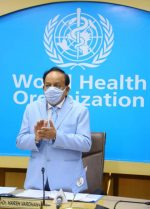Enhanced surveillance and public cooperation need of the hour to counter seasonal disease outbreak
Preventive measures should also be undertaken
New Delhi, 1st January 2018: Research indicates that disease outbreaks in India occur with seasonal regularity. Every region has its own particular malaise. For instance, Delhi witnesses an outbreak of dengue during monsoon and Mumbai sees leptospirosis cases spiraling. In the same season, Karnataka experiences chikungunya outbreak and other parts are afflicted by malaria. However, in 2018, there were two new potentially fatal infections struck populations several hundred miles away from regions where these diseases had previously occurred.
The first disease was Nipah which was reported first in Kerala. The second was Zika which was first reported in India in 2017. Nipah spread to humans in India through the consumption of contaminated fruit or date palm sap or through direct contact with a sick bat’s body fluids or droppings. Zika is a viral infection that causes mild fever and is spread by the Aedes aegypti mosquito, which also spreads dengue and chikungunya.
Speaking about this, Padma Shri Awardee, Dr KK Aggarwal, President, HCFI, said, “The Indian weather is very conducive for the growth of viruses such as those causing Zika. The mosquitoes that transmit this virus breed round the year. What makes the situation worse is lack of hygiene and sanitation. Houses in and around sources of potable water are more at risk. During monsoons, there are more breeding sites available thanks to the high humidity levels and optimal temperature, all of which supports their survival. The action must be collective for change to take place and the number of infections to reduce. The public must work together with the government and municipal bodies.”
Recently India has asked the US CDC to withdraw or modify the alert the CDC has issued cautioning pregnant women against travelling to India lest they risk a Zika infection. The India concern is valid but still all pregnant woman in India will remain at risk of ZIKA and therefore any pregnant woman if gets any dengue like illness in pregnancy ZIKA test should be done.
At present, there is no vaccine or specific drug available to prevent or to treat Zika infection. Patients should be advised to take paracetamol to relieve fever and pain, plenty of rest and plenty of liquids. Avoid aspirin, products containing aspirin, or other nonsteroidal anti-inflammatory drugs (NSAIDs) such as ibuprofen.
Adding further, Dr Aggarwal, who is also the President Elect CMAAO said, “The need of the hour is enhanced surveillance against the virus and its spread to areas within the country: community-based and at international airports and ports to track cases of acute febrile illness. While awareness needs to be created about the disease, the public needs to be reassured that there is no cause for undue concern if any cases are detected.”
Use of measures to protect against mosquito bites is very important to prevent Zika infection such as using insect repellent, covering as much of the body as possible with long, light-colored clothing, eliminating places where mosquitoes can breed and putting screens on windows and doors. People traveling to high risk areas should take protections from mosquito bites. Pregnant women should avoid traveling to high risk areas.





